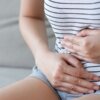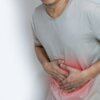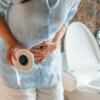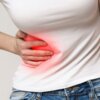
Endometriosis and Bloating
The endo belly is one of the most uncomfortable side effects of endometriosis. Endometriosis is a disease that affects approximately 176 million women around the world. [Source: endometriosis.org]
While people usually experience stomach pain, symptoms of endometriosis may be originating from the reproductive organs.
Endometriosis is a disorder where the uterus lining, is abnormally located outside of the uterus. This disease can affect the fallopian tubes, and pelvis lining.
Many women have to deal with endo belly, but that doesn’t mean that they have to bear the pain. There are different ways to treat this, and being proactive about it is the best way. Not only is endometriosis known for causing a very uncomfortable bloated feeling but additional symptoms such as lower back pain and changes in bowel patterns.
Some studies link endometriosis to endometrial cancer. Another even more common type of cancer that occurs more frequently in people who have endometriosis is ovarian cancer. Endometriosis could cause complications that result in infertility.
In this article, we’ll discuss endometriosis, what it feels like, some of its side effects, and, most importantly, highlight some red flags that might worsen your endo belly flare-ups.
Also Read: What Is Endometriosis?
What Helps Bloating From Endometriosis?
Bloating can be an uncomfortable and painful symptom of endometriosis. Feeling bloated causes pain, which can have significant side effects of its own. A good way to help reduce the bloating caused by endometriosis is to recognize and avoid the triggers that might cause an endo belly to flare up.
Also Read: How Is Endometriosis Diagnosed?
To address bloating, there can be 2 elements to the approach.
- Symptom management
- Addressing the root cause
To help reduce the symptoms of bloating, supporting the digestive process can be helpful. This can be a way to reduce the gas being produced.
Approaches include:
- A low FODMAP diet
- Digestive enzymes
- Charcoal tablets
- Peppermint oil
A combination of these approaches may help to reduce the amount of gas-producing foods as well as help to break down the fibres in fruits and vegetables further. Additionally, peppermint oil can support the gut lining, reducing the sensitivity of the nerves to the pain of bloating. [Source: NHS]
Alongside the management of the symptoms, working to address the underlying issue or root cause is important. Part of this underlying cause can be due to imbalances or overgrowths in the gut bacteria. This be referred to as:
To support the balance of the gut microbiome, specific supplements can be introduced. These include:
- Probiotics
- Prebiotics (PHGG, GOS, FOS)
- Antimicrobial herbs (oregano, berberine, allicin)
- Post-biotics (butyric acid)
Supporting the gut microbiome supports digestive function and bloating. The gut microbiome also supports immune and inflammatory processes throughout the entire body.
This means that supporting the gut can also support levels of inflammation in the endometrial tissues.
What Does Endometriosis “Endo Belly” Feel Like?

The bloating and swelling caused by endometriosis can be very uncomfortable and might be very painful for most women who experience it. The feeling of endo belly can be described as a feeling of fullness after a big meal combined with cramps and bloating. These symptoms can increase or worsen around the menstrual cycle.
The feeling of bloating can follow different patterns. This can be where there is very little bloating at the start of the day and this very gradually increased as the day goes on. This may indicate an issue in the large intestine.
The second is where there is bloating that appears within 1 hour of eating, with certain foods being worse than others. This can be considered a sign that there is an imbalance in the small intestine, such as SIBO.
Another pattern is where bloating is present at the same level for the majority of the time. This may be due to the increased pressure endometrial growths or fibroids are placing on the pelvic region.
In all 3 types, symptoms may worsen in alignment with menstrual patterns.
All in all, it’s far from a pleasant feeling, which is precisely why many women around the world are continually looking for new ways to combat endo belly. The pain caused by this can have a significant impact on the individual’s quality of life and contribute to pain, anxiety, poor sleep and low mood.
Can Endometriosis Cause Bloating and Weight Gain?
Endometrial bloating is a well-documented symptoms of endometriosis, and it happens to approximately one in every ten fertile women in the world. Endometriosis can cause severe bloating, which is more often than not very painful and uncomfortable.
Many women who suffer from this condition have reported that their disorder causes them to gain weight. [Source: NCBI]
Whole bloating or swelling of the stomach may look like weight has been gained, this bloating is often the accumulation of gas which doesn’t increase weight. However, it can make clothes feel tight.
It’s also possible for poor sleep to lead to weight gain. [Source: NCBI] Poor sleep is common in endometriosis due to the role that pain has on the individual. As well as this, thyroid imbalances can be seen in those with endometriosis. [Source: Pubmed]
Both poor sleep and thyroid issues can lead contribute to weight gain due to the role they play in energy levels and burning calories.
Can Endometriosis Affect Your Stomach?

Endometriosis can affect your stomach in more ways than one. Aside from the bloating, it can contribute to other gut symptoms such as:
- Diarrhoea
- Constipation
- Stomach cramps
- Painful defecation
- Nausea
- Vomiting
This increase of gas within the gut can contribute to bloating, pain, and discomfort during a flare-up and might make the person prone to flatulence.
A very common issue is that endometriosis is frequently misdiagnosed as IBS, another issue that affects the stomach in relatively similar ways.
Can Losing Weight Help Endometriosis?
A higher body mass index (BMI) has been reported to reduce the risk of developing endometriosis. [Source: Pubmed]
It has also been reported that women with more advanced endometriosis have a lower BMI when compared to women with milder forms of endometriosis. This indicated that a higher BMI is protective against developing endo. [Source: Pubmed]
However, it has also been suggested that obese women with abdominal pain may not be offered diagnostic testing for endometriosis. [Source: Pubmed] This can influence the statistics. Opposed to this, a 2020 study concluded that obesity increased the risk of endometriosis when compared to women of normal weight. [Source: Pubmed]
In addition to BMI, focusing on diet and nutrition may be more important than losing weight. Several studies have reported improved endometriosis symptoms following dietary changes. [Source: Pubmed]
What Foods Aggravate Endometriosis?
Many things directly aggravate endometriosis flare-ups and cause a painful endo belly. Particular foods will most definitely cause an agonizing flare-up, so it’s best to avoid them as much as possible. Below, we’ll list some of the most common foods that aggravate endometriosis. It’s important to keep in mind that a common reason that these foods are issues is because of imbalanced bacteria in the gut.
Red Meats and Endometriosis
Red meat has been associated with a higher risk of endometriosis.
Studies have reported that replacing red meat with fish, shellfish or eggs can reduce the risk of endometriosis. [Source: NCBI]
Fatty foods and Endometriosis
Highly processed fats, such as trans fats (found in processed foods and some confectionaries) can contribute to inflammation in the body. These have been reported to increase the risk of endometriosis.
On the other hand, omega-3 fats (found in oily fish, nuts and seeds) have been found to reduce the risk.
Alcohol and Endometriosis
High levels of alcohol intake have been shown to increase oestrogen levels which may influence the progression of endometriosis. [Source: webmd]
Alcohol has also been shown to increase levels of inflammation and lead to disruption in the gut microbiome. Both factors may contribute to symptoms of endometriosis. The processing of alcohol triggers inflammatory pathways in the body and increases oxidative stress, 2 factors involved in the ongoing nature of endometriosis symptoms.
Alongside this, it’s also been reported that alcohol is used in higher amounts by some with endometriosis as a coping mechanism. This can help sufferers deal with the pain and stress of endometriosis.
A 2022 analysis found that any alcohol use was shown to increase the risk of endometriosis. However, a more significant link was found in those with moderate/regular alcohol intake. [Source: Pubmed]
Is Dairy Bad for Endometriosis?

Studies have indicated that dairy can reduce the risk of developing endometriosis. In particular, this was reported when there were 3 or more servings per day of higher-fat dairy and cheese. [Source: NCBI] However, an increase in butter intake was found to increase the risk of endometriosis.
This may be due to the role calcium plays with vitamin D. Given the role of vitamin D in regulating the immune response and levels of inflammation, this could be a reason why calcium-rich foods reduce health issues.
This doesn’t mean that dairy is always well tolerated by everyone with endometriosis and bloating.
For some, high amounts of lactose may be an issue. This can lead to bloating and loose bowel movements if there are issues absorbing lactose. Lactose can also be an issue if there are imbalances in the gut bacteria, leading to the fermentation of lactose which may produce lots of gas and wind.
In others, the diary proteins may impact the conditions. Instead of these being poorly absorbed or mal-fermented (as lactose maybe) the proteins have the ability to trigger the immune system. Due to the immune response being inflammatory this may impact levels of inflammation in the gut as well as elsewhere.
Dairy can be a food worth questioning. To assess this, remove the food for 4-12 weeks to monitor symptoms. From here, a gradual reintroduce of dairy can be considered to assess tolerance while symptoms are monitored.
Endometriosis Bloating Pictures
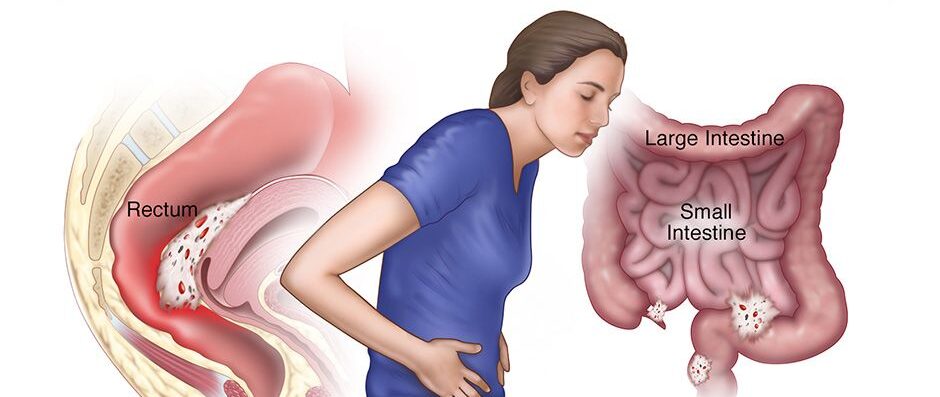


How to deflate endo belly
Endo belly can be caused by a variety of factors. These include:
- Inflammation
- Gut bacteria imbalance
- SIBO
- Food intolerances
- Fibroids
- Scar tissue
Working to address the causes of endo belly is an important way to fully resolve symptoms.
This can involve addressing the balance of the bacteria in the gut. Certain probiotics have been shown to reduce bloating. These include L Rhamnosus GG and L Plantarum 299V. Probiotics can help in a variety of ways to support the gut.
- Improves the levels of beneficial bacteria
- Reduce less beneficial organisms
- Supports the gut lining
- Supports the immune system in the gut
There can also be high-fibre foods that are producing more gas. These higher-fibre foods can be highly fermentable and when the gut is not balanced, there has the potential to increase gas levels.
A short-term diet to follow to assess for bloating foods is the low FODMAP diet. This is approached in 3 phases.
- Elimination phase – where all FODMAPs are removed
- Reintroduction phase – where the foods are gradually reintroduced and symptoms monitored
- Maintenance phase – where individual triggers have been removed
Read more: Low FODMAP Diet Guide
Does Endometriosis cause bloating
One of the common symptoms of endometriosis is bloating. There are 2 factors that can lead to endo belly and bloating in endometriosis.
- Changes in the gut
- Changes in the endometrial tissue
The changes in the gut can involve alterations in the gut bacteria or increased sensitivity in the nerves along the gut lining. Due to the gut bacteria helping to digest foods through fermentation, changes in the gut bacteria can contribute to more gas being produced.
It’s also possible that if the nerves along the gut lining are more sensitive, the presence of even a small or normal amount of gas can feel very painful.
The changes in the endometrial tissue may be seen more when the endo belly is worse around the menstrual period. The changes in sex hormones can lead to increased sensitivity and pain as well as bloating.
Endometriosis symptoms
The symptoms of endometriosis can very from person to person. This means that the number of endometriosis symptoms being experienced can differ from person to person. It’s also common for the severity to intensity of these symptoms to vary.
Common symptoms of endometriosis include:
- Painful intercourse (sex)
- Infertility
- Painful periods
- Changes in bowel function (nausea, bloating, constipation, diarrhoea)
- Lower abdominal pain
- Back pain
Some women may not experience any of the painful aspects of endometriosis and are only diagnosed when undergoing investigations for infertility. [Source: NCBI]
Does endo belly go away after surgery?
A hysterectomy is a type of surgery that is used to remove the uterus of those with endometriosis. This surgery may also remove the ovaries.
A 2020 study reported certain improvements in symptoms following this surgery. [Source: Pubmed]
- Reduction of the pain of any severity decreased by 28% after the hysterectomy.
- Reduction of severe pain decreased by 76% after the hysterectomy.
- The majority of women (84%) were satisfied with the surgical result.
This study also concluded that the improvement in symptoms did not vary between those who had their ovarian tissue removed and those that did not.
Does endo belly make you weigh more?
The bloating itself is not likely a cause of weight gas. This bloating in endometriosis is most commonly due to gas building up in the intestine, or a change in the muscle function in the abdomen.
However, other factors associated with endometriosis can lead to weight gain. This can be due to thyroid imbalances and poor sleep, both of which can regulate how we burn energy.
If medications are being taken for endometriosis, these may also contribute to weight gain. A common group of medications to help to regulate hormones is Aromatase inhibitors.
Does endo belly make you tired?
Tiredness and fatigue can be common symptom that is seen in endometriosis. Frequent fatigue is reported in around 50% of those with endometriosis. [Source: NCBI]
This can be the result of inflammatory messengers, called cytokines, contributing to fatigue as the body tries to heal the endometrial tissue.
In endometriosis, the pain itself can contribute to poor sleep which can then impact energy levels and make someone feel tired.
A link has also been reported between endometriosis and thyroid issues. Since the thyroid regulates energy levels within the body, thyroid imbalances or dysfunction can lead to fatigue and tiredness.[Source: Pubmed]
Can stress cause endo belly?
Stress has been found to contribute to changes in the gut, both in a bacterial and an inflammatory way. These changes can be partly responsible for gut symptoms. Stress has also been very closely associated with endometriosis but it’s not been concluded whether or not stress is the cause or the result of endometriosis.
It is known that stress can lead to changes in the immune system as well as in levels of inflammation in the body. This is indicating a link between stress and endometriosis. Studies have also found that mindfulness practices have been helpful in reducing the symptoms of endometriosis.
Regardless of whether or not stress is a cause or a consequence of endometriosis if present it is an area that needs to be supported.
Gut Health and Endometriosis
If you have endometriosis, there are many treatment options available out there that will help you with your disease.
A key part of this is supporting and rebalancing the beneficial bacteria in the gut. Elevations in key species within the gut microbiome have been strongly linked to the severity of endometriosis, inflammatory and immune balance.
Working with a gut health practitioner can help to guide you through this process and support you to better health.

